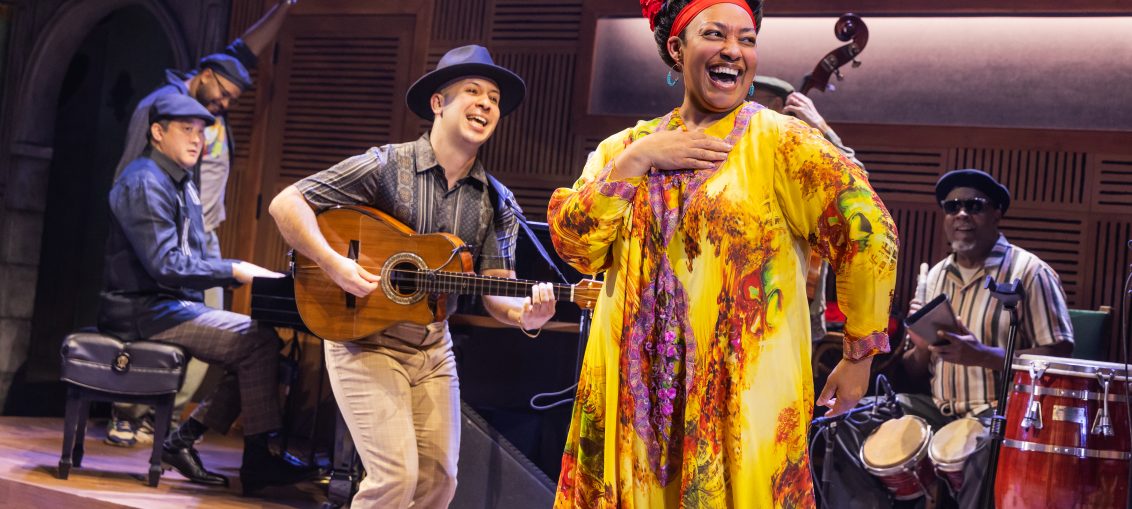
While any number of musicals are based on popular movies, precious few are based on documentaries. Fortunately, Saheem Ali had the wonderful idea to bring Wim Wender’s 1999 documentary Buena Vista Social Club to the stage. After a run at Atlantic Theater Company in late 2023, the celebration of Cuban music and history has come to Broadway.
The musical’s (rather thin) story evokes the melodrama of classic telenovelas, with a romance that is star-crossed by class divisions and a passionate artist who must choose between creating music for the world or for her own community. In 1959, as revolution sweeps across the island, young upper-class singer Omara Portuondo must choose between leaving Cuba to perform with her beloved sister or remaining to create authentic music with the artists she admires. In the 1990s, the artists reunite to create an album that will bring their sound to the world—and open old wounds for everyone.
The fact that the story is rooted in real people and historic events keeps the melodrama somewhat at arm’s length, but these are situations we’ve seen in other shows and handled with more delicacy. Marco Ramirez’s book occasionally feels rushed and could dig deeper into some of the story elements—for example, the revolution seems to be happening far away and barely affecting any of the musicians. Hearing what people from different social backgrounds think about the social upheaval would add some depth to the characters. (For the record, the off-Broadway version of the show made the threat of violence more immediate and raised the stakes considerably.)
The songs—all from the real Buena Vista Social Club—only sometimes reflect on the action, but are not awkwardly shoehorned in as with traditional jukebox musicals. These songs were written to be performed in clubs and concert settings, and Ali (as both director and developer) finds a strong balance between classic musical theater and a concert hall. The on-stage band–with music supervision by Dean Sharenow and orchestrations, arrangements and music direction by Marco Paguia–becomes a character in its own right, and watching them perform is genuinely exciting.
Many of the performers are making their Broadway debuts, and their enthusiasm for the music, the dancing (the excellent choreography is by the husband-and-wife team of Justin Peck and Patricia Delgado) is palpable. Natalie Venetia Belcon commands attention and owns the stage effortlessly as the older Omara. We can see the effects her choices have had on her life—both positive and negative—and Belcon makes the character beautifully complex and nuanced. As the younger version of Omara, Isa Antonetti sings and dances very nicely (especially when singing in harmony with the excellent Ashley De La Rosa as her sister Haydee), but her storyline gives her less to work with. When young Omara falls for a singer named Ibrahim (Wesley Wray), their chemistry is more charming than passionate, but this fits the characters well. Belcon’s chemistry with the older Ibrahim (Mel Semé) has the weight and power of years behind it, and their moments together are beautifully touching.
Ultimately this is a love story—a story about people in love with music, and the music is the star of the show. The on-stage band, singers and dancers more than do justice to the unique Cuban sound. While familiarity with Cuban music—or with the Spanish language—would be helpful in fully appreciating the songs that punctuate and comment on the narrative, neither is necessary to enjoy the show as a whole. Similarly, familiarity with the documentary is also not necessary to enjoy the evening.
 Saturday, January 10, 2026
Saturday, January 10, 2026